By Headlinenews.news Investigative Team
Kurfi LGA, Katsina State | June 25, 2025
In a powerful and defiant stand against years of unchecked terror, villagers in Kurfi Local Government Area of Katsina State turned the tide of violence on Wednesday, June 25, by confronting and defeating a group of armed bandits attempting to abduct community members. With nothing more than cutlasses, bows and arrows, and locally made firearms, the villagers launched a collective self-defense that led to the complete decimation of the invading terrorists—a rare but symbolic victory in Nigeria’s protracted war against internal insecurity.
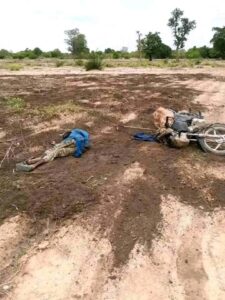
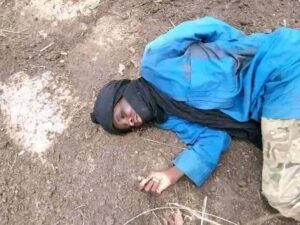
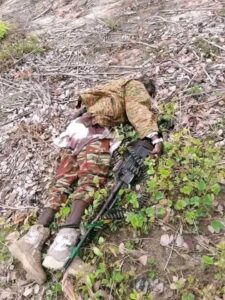
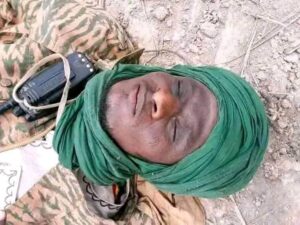
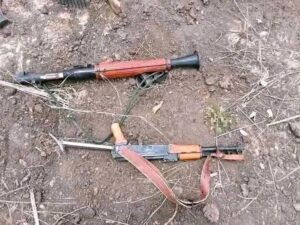
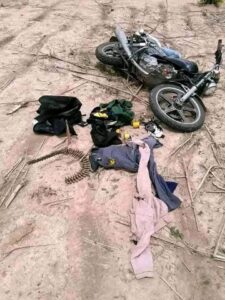

The Incident: Resistance in Rural Katsina
According to eyewitness accounts, a convoy of armed bandits stormed a village in Kurfi LGA at dawn, intending to carry out mass abductions—a grim routine in northern Nigeria. But this time, the villagers, emboldened by recent appeals for communal vigilance, refused to run. They rallied en masse with makeshift weapons and ambushed the invaders.
“It was like a miracle. We were not ready to be kidnapped again. Enough is enough,” said Ibrahim Adamu, a youth leader in the village.
None of the assailants escaped. Their weapons were recovered and handed over to local authorities. The Chairman of Kurfi LGA, who visited the scene shortly after, was received with jubilation by the villagers, many of whom credited his persistent encouragement of self-defense and vigilance.
Historical Context: Insecurity in the Shadow of Daura
Katsina, the home state of former President Muhammadu Buhari, has paradoxically become one of the most terrorized regions in Nigeria. Daura, Buhari’s ancestral hometown, just 90km from Kurfi, has witnessed repeated abductions over the past five years—including the high-profile Kankara schoolboys kidnapping in 2020.
Ironically, despite being the symbolic epicenter of Nigeria’s northern elite, the state has remained largely unprotected. In a symbolic move earlier this year, former President Buhari relocated from his Daura country home to Kaduna—a decision interpreted by many as a quiet admission of Katsina’s worsening insecurity.
“When a former Commander-in-Chief can no longer sleep in his hometown, what hope is left for the ordinary Nigerian?”
— Dr. Musa Farouk, Security Analyst, Arewa Intelligence Forum

The Numbers Paint a Bleak Picture
- Metric Katsina State (2020–2024)
- Confirmed Kidnappings 3,280+
- Banditry-Related Deaths 2,100+
- Displaced Persons (IDPs) 87,000+
- Schools Closed Due to Insecurity 71
- Rural Communities Deserted Over 300
These figures, drawn from NEMA, SBM Intelligence, and Amnesty International, demonstrate that Katsina remains at the heart of Nigeria’s rural insecurity crisis.
Legal and Moral Imperatives: Is Self-Defense a Crime?
The Nigerian Constitution under Section 33(2)(a) provides for the right to self-defense in situations where one’s life is under immediate threat. Legal scholars argue that in areas where state protection is absent, the people have not just the right—but the obligation—to protect themselves.
“Self-defense is not vigilantism. It is a constitutional response to existential threat when the state is absent.”
— Prof. Amina Garba, Criminal Law, Ahmadu Bello University
With formal security overwhelmed or under-equipped, more rural communities across Zamfara, Niger, and Benue states have begun adopting village defense militias, echoing the Amotekun model in the Southwest and the Civilian JTF in the Northeast.
Strategic Analysis: The Implication of Kurfi’s Rebellion
This incident may signal a psychological turning point in the security narrative. It reflects growing public disenchantment with passive victimhood and a readiness to defend lives and livelihoods by all means necessary.
However, experts warn that without coordination, such spontaneous defense efforts can spiral into ethnic militias or reprisal violence.
“The government must channel this civic courage into formalized security architecture—train, arm, and regulate community defense groups,”
— Commodore Ibrahim Abdulrahman (Rtd), National Security Consultant
Conclusion: A Nation Awakens
The events in Kurfi are more than a local story—they are a national signal. As the Nigerian state struggles to fulfill its most basic obligation of protection, ordinary citizens are rewriting the narrative of resilience.
This victory should not be romanticized—but it must not be ignored. It is a wake-up call to Abuja, to security agencies, and to every Nigerian: a government that cannot protect its people must empower them to protect themselves.
“This is not an act of rebellion. It is an act of survival. We didn’t fight for glory—we fought because we had no other choice.”
— Village Elder, Kurfi (Name withheld for safety)
Headlinenews.news Special Investigative Report.

Kurfi Uprising: Katsina Villagers Defeat Bandits in Rare Self-Defense Victory
Kurfi LGA, Katsina | June 25, 2025 – In a bold act of self-defense, villagers in Kurfi Local Government Area of Katsina State confronted and overpowered a group of armed terrorists attempting a mass abduction. Armed only with cutlasses, bows and arrows, and dane guns, the villagers killed all the attackers in what is being hailed as a turning point in Nigeria’s rural resistance to terrorism.
The Chairman of Kurfi LGA, who had previously encouraged local self-defense, was celebrated by the community during his visit to the scene. This comes amid growing frustration over federal security failures in northern Nigeria.
Katsina, ironically the home state of former President Muhammadu Buhari, has remained a hotspot of insecurity. Earlier this year, Buhari quietly relocated from his Daura country home to Kaduna due to persistent attacks, further underscoring the gravity of the crisis.
Legal experts affirm that self-defense is constitutionally protected under Nigerian law, especially when government protection is absent. The Kurfi success mirrors similar defense models like Amotekun and the Civilian JTF, raising calls for structured, state-supported rural defense forces.
“This is not rebellion—it’s survival,” said a village elder.
Kurfi may have lit the spark. Nigeria’s rural communities are no longer waiting to be rescued—they are learning to defend themselves.
For full report, visit: Headlinenews.news




